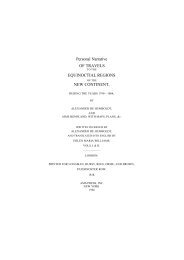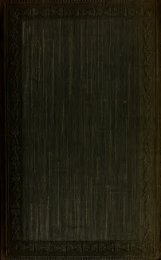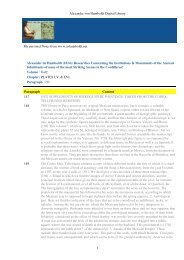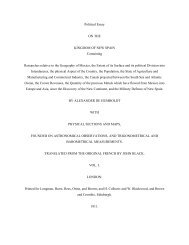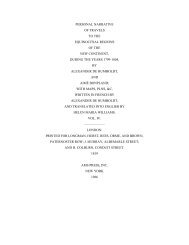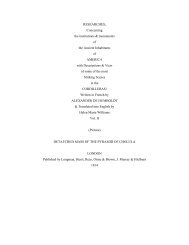See the complete document here
See the complete document here
See the complete document here
You also want an ePaper? Increase the reach of your titles
YUMPU automatically turns print PDFs into web optimized ePapers that Google loves.
iiYsiLAL conij:mplation of <strong>the</strong> universe. 12 i<br />
coasts, many straits and isthmuses. Such a configuration of<br />
cjntinents and of islands that have been partly severed and<br />
partly upheaved by volcanic agency in rows or in far project-<br />
ing fissures, early led to geognostic views regarding eruptions,<br />
terrestrial revolutions, and outpourings of <strong>the</strong> swollen higher<br />
eeas into those below <strong>the</strong>m. The Euxine, <strong>the</strong> Dardanelles,<br />
<strong>the</strong> Straits of Gades, and <strong>the</strong> Mediterranean, with its numer-<br />
ous islands, were well fitted to draw attention to such a system<br />
of sluices. The Orphic Argonaut, who probably lived in<br />
Christian times, has interwoven old mythical narrations in his<br />
composition. He sings of <strong>the</strong> division of <strong>the</strong> ancient Lyktonia<br />
into separate islands, " when <strong>the</strong> dark-haired Poseidon, in an-<br />
ger with Fa<strong>the</strong>r Kronion, struck Lyktonia W'ith <strong>the</strong> golden<br />
trident." Similar fancies, which may often certainly have<br />
sprung from an imperfect knowledge of geographical relations,<br />
were frequently elaborated in <strong>the</strong> erudite Alexandrian school,<br />
w^hich was so partial to everything connected with antiquity.<br />
Whe<strong>the</strong>r <strong>the</strong> myth of <strong>the</strong> breaking up of Atlantis be a vague<br />
and western reflection of that of Lyktonia, as I have elsew<strong>here</strong><br />
show^n to be probable, or whe<strong>the</strong>r, according to Otfried<br />
Miiller, " <strong>the</strong> destruction of Lyktonia (Leukoma) refers to <strong>the</strong><br />
Samothracian legend of a great flood which changed <strong>the</strong> form<br />
of that district,"* is a question that it is unnecessary <strong>here</strong> to<br />
decide.<br />
* Ukert, Geogr. dcr Griecken und Rumer, tli. i., aLth. 2, s. 345-348,<br />
and th. ii.,abth. 1, s. 194; Johaunes v. INIullei', Werke, bd. i., s. 38 ; Hum-<br />
boldt, Examen Critique, t. i., p. 112 and 171 ; Otfried Miiller, Minyer,<br />
s. 64 ; and <strong>the</strong> latter, again, iu a too favorable critique of my memoir<br />
on <strong>the</strong> Mytkische Geographie dcr Griecken (Goit. gelehrte Anzeigen,<br />
1838). I expressed myself as follows: "In raising questions which<br />
are of so great importance with respect, to philological studies, I can<br />
not wholly pass over all mention of that which belongs less to <strong>the</strong> de-<br />
ecriptiou of <strong>the</strong> actual world than to <strong>the</strong> cycle of mythical geography.<br />
It is <strong>the</strong> same with space as with time. Histoiy can not be treated<br />
from a philosophical point of view, if <strong>the</strong> heroic ages be wholly lost<br />
Bight of. National myths, when blended with history and geography,<br />
can not be regarded as appertaining wholly to <strong>the</strong> domain of <strong>the</strong> ideal<br />
world. Althousrh vasrueness is one of its distinctive attributes, and svmhols<br />
cover reality by a more or less thick vail, myths, when intimately<br />
connected toge<strong>the</strong>r, never<strong>the</strong>less reveal <strong>the</strong> ancient source from which<br />
<strong>the</strong> earliest glimpses of cosmogi'aphy and physical science have been<br />
derived. The facts recorded in primitive history and geography are<br />
not mere ingenious fables, but ra<strong>the</strong>r <strong>the</strong> reflection of <strong>the</strong> opinion generally<br />
admitted regarding <strong>the</strong> actual world." The great investigator<br />
of antiquity (whose opinion is so favorable to me, and whose early<br />
death in <strong>the</strong> land of Greece, on which he had bestowed such profound<br />
and varied research, has been universally lamented) considered, on <strong>the</strong><br />
lontrary, that " <strong>the</strong> chief part of <strong>the</strong> poetic idea of <strong>the</strong> earth, as it oc-<br />
Vol. II.—F




